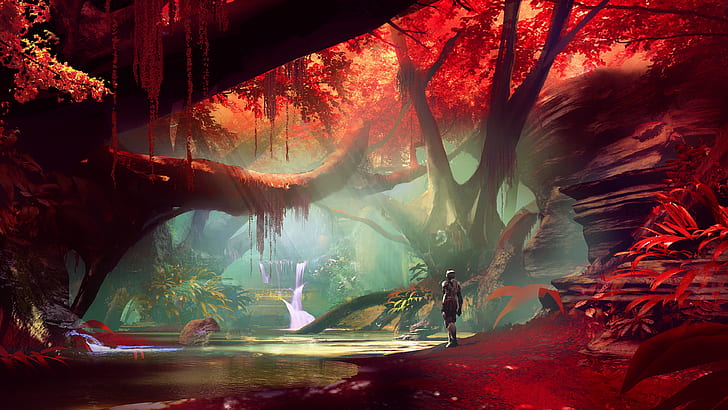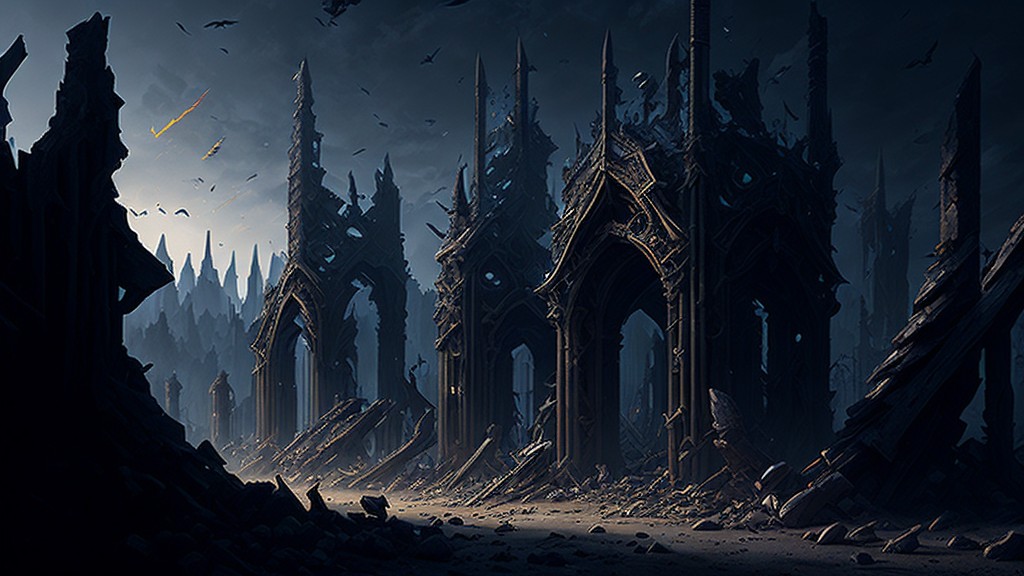Ruins of Sol Cindareth
The Broken Cradle
There was once a city called Sol Cindareth, nestled like a crown within the heart of the Northern Expanse. It shimmered in gold and silver, bathed in the soft red glow of sunset. Its towers reached upward like poetry in marble; its streets were paved in light, music, and laughter. elves came from across Lys Verdan to learn the arts, to weave magic into wine, and to indulge in creativity without restraint. For a time, it was a heaven built by hands that believed themselves immortal.
Now, it is known only as the Broken Cradle—a desolate basin of black stone and ash, ringed by mountains that bleed, and crowned by a tower that was never supposed to be.
City of Indulgence
Sol Cindareth was built not for war, nor harvest, nor worship in the traditional sense. It was a city of indulgence, creation, and expression. Every quarter was dedicated to a different passion: the District of Flamewrights crafted living glass and molten metal statues; the Balm-Houses of Therenis brewed emotional potions that induced dreams or tears; the Hall of Veils housed masked performances so powerful they were said to rewrite memory.
At its center sat a shrine: not a temple, but a conduit. Below the city ran a tether to the deep plane of elemental fire, where the great Fire Titan—name long unspoken—rested in a dreaming heat. From this rift, the elves drew power, inspiration, and unquenchable energy. It warmed their forges, lit their canvases, and danced in their hearts. For centuries, it was considered a holy balance: passion with precision, fire with grace.
But fire is never content to be held.
The Fall of Sol Cindareth
The end came, as it often does, slowly and then all at once.
From the southern wilds, long past the forests and groves, came the Verdant Plague. It was not disease, but an invading will a colony of root and flesh, hybrid and horror, The war that started when the largest of trees fell; Trees moved. Corpses bloomed. People turned.
Sol Cindareth tried to repel the invasion with sorcery and spectacle. Walls of living flame lit the horizon for weeks. But the city was never made for siegecraft. They had no army, no hardened hearts only brilliance, beauty, and denial.
Then came the Stranger in Black.
He arrived at the gates under moonlight, clad in dark robes. No one saw his face. No one heard his name. But he made an offer: a tower, drawn from the stars and the void itself, that could stop the tide.
They accepted.
The tower rose overnight, carved in gold and silver, etched with runes and promises. For a brief moment, Sol Cindareth rejoiced.
But at dawn, the sky turned black. The tower’s metal shell charred and cracked, turning obsidian, then began to bleed darkness into the land. One by one, the fires of Sol Cindareth were snuffed. The magic drained. The passion died. In a matter of hours, the city was still eerily still.
When the Verdant Plague reached its walls, it found no resistance. It also found nothing left to claim.
The fire titan’s rift had sealed. The Stranger was gone. And Sol Cindareth was a grave.
What Remains
Today, the Broken Cradle is surrounded by warped, collapsed ruins. Marble palaces lean like drunkards. Gold veins lie buried under soot and cracked stone. Nature does not return here. No birds nest in the spires. No vines reclaim the streets.
Those who enter seeking treasure or lost artistry find only the Lich Troupe.
Within the ruins dwell the undead remnants of Sol Cindareth’s greatest playwrights, musicians, and artists now reanimated by obsession rather than hunger. They stage endless, twisted plays across the remains of their beloved districts. Puppeteered skeletons dance on strings of sinew. Mummified nobles recite broken poetry as their limbs crack. Harps are strung with gut and play only lament.
Looters who intrude too far are often captured, transfigured, and cast in the performances. One merchant was turned into a musical instrument. Another a lover frozen in amber acts the same tragic role every night, screaming silently beneath her mask.
It is said that the tower itself, the Black Spire, watches these displays like a patron god—silent, approving, waiting for the final act.




Comments